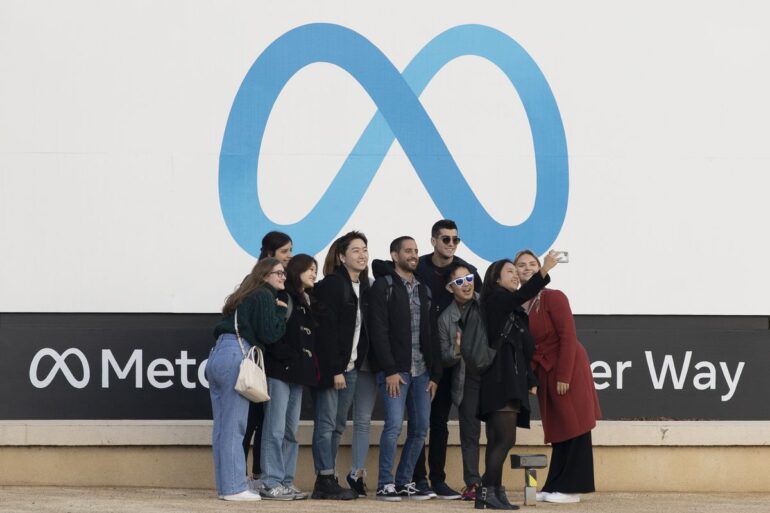TL;DR:
- Meta’s shares surged 15% in after-hours trading after a strong Q4 earnings report.
- The company declared a 50 cents per share dividend and authorized a $50 billion share buyback program.
- Q4 revenue reached $40.1 billion, surpassing predictions and marking a 25% YoY increase.
- Meta is focusing on integrating AI into its core products to advance the metaverse vision.
- Mark Zuckerberg emphasized AI research and plans to invest $9 billion in Nvidia chips for scaling AI.
- AI will enhance advertising campaigns and support new Meta products, including AI chatbots.
- Regulatory challenges loom after a contentious congressional hearing on platform impacts.
- Meta seeks to diversify its core business as user numbers shift, particularly among young users.
Main AI News:
Meta, the tech giant formerly known as Facebook, witnessed a remarkable 15% surge in its share prices during after-hours trading, propelled by the release of a robust fourth-quarter earnings report. This positive momentum arrived just a day after CEO Mark Zuckerberg’s strenuous appearance in a contentious congressional hearing. The company not only showcased its financial prowess but also unveiled a significant strategic shift, as it prepares to dive deeper into the realm of artificial intelligence (AI).
In a groundbreaking move, Meta announced its inaugural dividend distribution, with investors set to receive a generous 50 cents per share. Simultaneously, the company has greenlit a massive $50 billion share buyback program. These strategic financial initiatives signal Meta’s commitment to maximizing shareholder value while reinforcing its financial stability.
The financial results for the fourth quarter of 2023 were nothing short of impressive, with Meta reporting a total revenue of $40.1 billion. This figure comfortably surpassed the predicted revenue of $39.18 billion and marked a substantial 25% year-over-year growth. This robust performance is part of Meta’s broader strategy to infuse AI capabilities into its core product offerings.
In a statement accompanying the earnings report, Mark Zuckerberg emphasized the company’s dedication to advancing AI and the metaverse. He stated, “We expect our ambitious long-term AI research and product development efforts will require growing infrastructure investments beyond this year.”
Zuckerberg’s commitment to AI investment was evident in the previous quarter’s earnings call, where he outlined it as the company’s primary focus for 2024. Moreover, he revealed Meta’s acquisition plans for Nvidia chips worth $9 billion, a move aimed at bolstering their AI scaling efforts.
AI is poised to play a pivotal role in Meta’s future, enhancing advertising campaigns, driving advertising revenue growth, and supporting the development of innovative Meta products, including AI-driven chatbots. Advertising remains the core business of Meta, as reflected in its fourth-quarter advertising revenue of $38.7 billion, a substantial increase compared to $31.25 billion during the same period in the prior year. Nevertheless, Meta envisions a broader deployment of AI services in the near future, promising further advancements in the coming months.
Meta’s quest for efficiency was evident in its workforce restructuring efforts, which saw over 20,000 employees laid off in 2023. This “year of efficiency,” as branded by Zuckerberg, paid dividends, with Meta’s operating margin doubling from 20% to an impressive 41% compared to the same quarter in 2022. Concurrently, expenses decreased by 8% year over year, totaling $23.73 billion. Chief Financial Officer Susan Li reported that Meta had 67,300 employees at the end of the fourth quarter, marking a 22% reduction from the previous year but a 2% increase from the third quarter, signaling a resumption of hiring efforts.
Despite its financial prowess and strategic direction, Meta faces significant regulatory headwinds. The recent congressional hearing, which focused on the impact of tech platforms on young users, raised concerns among investors. Lawmakers discussed potential legislation that could revoke Meta’s and other platforms’ legal immunity for content posted on their platforms. This follows a massive lawsuit filed by attorneys general from 41 states, along with additional legal action from New Mexico’s attorney general, related to child sexual exploitation and trafficking concerns.
In response to these regulatory challenges, Meta is actively diversifying its core business, which has traditionally relied heavily on advertising and user data collection. Reality Labs, the segment responsible for Meta’s virtual reality products, reported losses of $4.65 billion in the fourth quarter, up from $4.28 billion the previous year, contributing to an overall annual loss of $16.12 billion in 2023. Meta expects these operating losses to continue to rise significantly as it strives to scale its ecosystem.
Additionally, Meta faces a user migration challenge, particularly among young users who are increasingly opting for newer platforms like TikTok. Although the company’s platforms continue to grow rapidly outside of the United States, particularly in regions like North America, Meta acknowledges the evolving landscape and the need to adapt to shifting user preferences.
In the eyes of lawmakers, the popularity of Facebook and Instagram among teens has become a contentious issue, potentially affecting the growth trajectory of these platforms. Meta remains committed to navigating these challenges while leveraging its financial strength and AI advancements to shape its future in the ever-evolving tech landscape.
Conclusion:
Meta’s financial strength, AI focus, and dividend debut have bolstered investor confidence. However, regulatory challenges and shifting user preferences underscore the need for the company to adapt and diversify its offerings beyond advertising. The market will closely watch Meta’s ability to navigate these challenges and its continued investments in AI.

